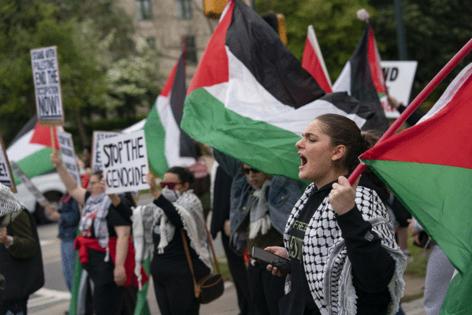Commentary: How our words about the Israel-Hamas war can add to hostilities -- or help on a path to peace
Published in Op Eds
The language people use to talk about the Israel-Hamas war has power: It can contribute to misunderstanding and alienation, but it can also bring about appreciation for concepts that can seem impossible during this kind of conflict, such as peace.
I was born to a Palestinian Arab father and an Israeli Jewish mother — a union that might sound romantic at first. In reality, my parents were the Romeo and Juliet of falafel stands. They couldn’t marry; interfaith marriages are illegal in Israel, and their type of romance is taboo in the Palestinian territories. As one of the few children born of such unions, I’ve felt like an outsider my entire life.
On weekends, my family usually visited Palestinian families in Nazareth or accompanied Israeli friends to a kibbutz. Wherever we went, my parents coached us to adjust our identities to fit in. Among Palestinians, speaking too much Hebrew or making too many references to popular Israeli books or music was often frowned upon. With Israeli friends, I learned it was better to refrain from speaking Arabic and to downplay connections to religions other than Judaism.
We were like water, always reflecting the people in front of us and hiding what was underneath.
I studied to become a writer and my early poetry was preoccupied with my search for belonging. I wrote first in Hebrew and then in Arabic. For years, I wrote for Israeli audiences; later, I switched my focus to Arab audiences. Yet I felt incomplete either way, as if I had to sacrifice part of myself to reach anyone. Now I write in English, which strikes me as more neutral.
During the current Israel-Hamas war, I’ve noticed the words that people on both sides of the conflict use and avoid, and what those choices say about their sense of identity and belonging.
Some of my Israeli friends, even those who consider themselves left-wing, say things like “There’s no such thing as Palestinians; that place never existed,” a sentiment that echoes that of some Israeli leaders. Similarly, some Palestinian leaders deny Israel’s existence, and some of my Palestinian friends insist that my mother isn’t an Israeli, just a Jew.
What people don’t say is just as relevant. Many Israelis shy away from terms such as “apartheid” and “genocide,” as if using the words could be a first step toward acknowledging injustices. And many Palestinians avoid words such as “conflict” and “war” because they believe that Israel is responsible for the hostilities taking place. Some Palestinians also eschew the term “terrorism,” viewing Hamas’ Oct. 7, 2023, attack as legitimate resistance to occupation.
Semantic differences can be signaled in nonverbal ways too, especially on social media. The watermelon emoji, for example, with colors like the Palestinian flag’s, is used to signal support for Gaza, while the yellow ribbon emoji is used to indicate support for Israel.
I’ve learned to use both groups’ terms for something at the same time whenever possible to preserve my hybrid identity and maintain neutrality. For example, when I speak of the holy city, I call it “Jerusalem-Al-Quds,” embracing both its Israeli and Palestinian names. I use the terms “Nakba” and “establishment of Israel” in the same sentence. This is my way of respecting both narratives.
I also draw on terminology from both sides in my writing, recognizing that the weaponization of language traps people in denial. It causes them to mistake the light of empathy for darkness, much as in Plato’s allegory of the cave, and overlook the possibility of coexistence. I see trying to liberate words from their cages as part of my job.
Because if we can’t communicate about our pain and suffering, it’s no surprise that we see peace as a form of weakness or surrender.
For many Palestinians, the two-state solution is an empty American promise, and therefore permission for Israeli occupation. For many Israelis, a two-state solution is a precursor to another Oct. 7 massacre. I can’t blame any of them for their fears and traumas. But I hope to be one of the many people who help them understand the word “peace” as a positive and a possibility.
_____
Amir Sommer is an award-winning poet and author who divides his time between Berlin and California.
_____
©2024 Los Angeles Times. Visit at latimes.com. Distributed by Tribune Content Agency, LLC.




























































Comments